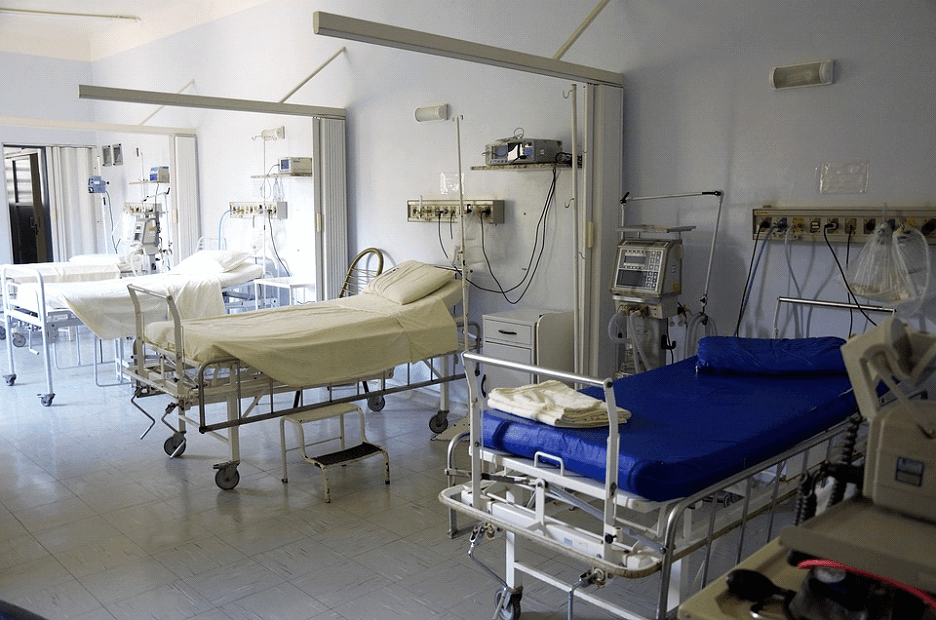Fillable Form Emergency Room Discharge Paper
Emergency Room Discharge Paper is used to show that patient was discharge from hospital or clinic after treatment and rest.
Fill and sign Emergency Room Discharge Paper online and download in PDF.
What is an Emergency Room Discharge Paper?
Room Discharge papers are medical documents used by hospitals in order to record the discharge and departure of patients who were admitted to the hospital through the emergency room. All hospitals have a discharge paper requirement, wherein they record information about a patient and the treatment administered to them as well as the particulars of the discharge process.
The emergency room is the part of the hospital where urgent medical cases are brought to be addressed as soon as possible. It serves as the first point of contact for patients seeking urgent medical care when their conditions cannot wait for a regular doctor's appointment.
Emergency rooms are equipped to handle a wide range of medical emergencies, from severe injuries, sudden illness, life-threatening conditions, and so on. In order to keep records of the patient’s treatment, hospitals make use of discharge papers, recording what the patient was treated for, the method of treatment used, and other details about their medical condition.
Hospital discharge documents are important as well for legal reasons, as they record decisions made during treatment (such as what test or procedure was used to treat the patient) and the reasons for why the hospital will discharge the patient. Whatever happens after hospital discharge or even what happens during hospital discharge, if legal action or further medical attention is required, the discharge papers are important in order to provide information to legal professionals or outside healthcare providers that will then be used for the necessary proceedings.
How do I fill out an Emergency Room Discharge Paper?
Get a copy of Emergency Room Discharge Paper template in PDF format.
You may find a fillable template for Emergency Room Discharge Papers here. Make sure that all information entered here is correct and accurate, as it will serve as important information for the patient’s medical history.
Patient Details
Patient’s Name
Enter the patient’s first name, last name, and middle initial.
Date of Birth
Enter the patient’s date of birth.
Age
Enter the patient’s age.
Sex
Enter the patient’s sex.
Address
Enter the patient’s street address, city, state, and ZIP Code.
Primary Health Care Professional Details
Health Care Professional’s Name
Enter the first name, last name, and middle initial of the health care professional that treated the patient.
Hospital/Clinic Name
Enter the name of the hospital or clinic that the patient was treated at.
Address
Enter the street address, city, state, and ZIP code of the hospital.
Admission and Discharge Details
Date of Admission
Enter the date that the patient was admitted into the hospital.
Source of Referral
If the patient was referred to the hospital, enter the source that referred them to the hospital.
Method of Admission
Enter the method by which the patient was admitted to the hospital.
Date of Discharge
Enter the date that the patient was discharged.
Discharge Reason
Mark the box that corresponds to the reason for which the patient was discharged. Check only one of the following:
- Treated
- Transferred
- Discharge Against Advice
- Patient Died (Enter the date of death in the space provided).
Diagnosis and Procedures
Diagnosis
Enter a short description of the diagnosis of the patient. If more space is required, attach an appropriately labeled sheet of paper to this form and enter the diagnosis there.
Operation and Procedures
Enter a short description of the procedures and operations that the patient went through for treatment. If more space is required, attach an appropriately labeled sheet of paper to this form and enter the operations and procedures performed there.
Medication Details
Medication on Discharge
Enter the medications prescribed to the patient upon discharge, if any. If the healthcare provider's instructions for the patient's post-care include other activities or a date for a follow-up appointment, indicate them here as well as all the instructions given by the healthcare provider.
Prepared By
Signature
Sign the form in the space provided.
Date
Enter the date that you signed and prepared this form.
Name
Enter your name.
Job Title
Enter your job title.
Start filling out a Emergency Room Discharge Paper sample and export in PDF.
Frequently Asked Questions (FAQs)
How long does it usually take to receive emergency room discharge papers?
The time it takes to receive emergency room discharge papers can vary depending on the hospital's procedures and the complexity of the case. In some cases, patients may receive discharge papers shortly after being treated, while in other cases, it may take longer.
Can I request a copy of my emergency room discharge papers?
Yes, patients have the right to request a copy of their emergency room discharge papers. Hospitals are required to provide patients with access to their medical records upon request, although there may be a process or fee involved.
Are emergency room discharge papers legally binding?
Emergency room discharge papers are not legally binding in the same way that a contract might be, but they do serve as a record of the care you received and the instructions you were given upon discharge from the emergency room.
Can I be denied emergency medical care if I can't pay?
No, emergency medical care cannot be denied based on a patient's ability to pay. Under the Emergency Medical Treatment and Labor Act (EMTALA), hospitals are required to provide emergency medical treatment to anyone who seeks care in the emergency room, regardless of their ability to pay.
What should I bring with me to the emergency room?
When going to the emergency room, it's helpful to bring your identification, health insurance information, a list of any medications you are currently taking, and any relevant medical history or documents.
How long does it typically take to be seen in the emergency room?
The time it takes to be seen in the emergency room can vary depending on the severity of your condition and the volume of patients at the time. Patients with life-threatening conditions are typically seen immediately, while those with less urgent needs may have to wait longer. The availability of medical equipment and any given healthcare team or medical team will also play a role in how quickly your needs can be addressed.
What is triage and how does it work in the emergency room?
Triage is the process of determining the priority of patients' treatments based on the severity of their condition. In the emergency room, triage nurses assess patients as they arrive and prioritize them based on the urgency of their medical needs.
Can I request a specific doctor in the emergency room?
In most cases, patients cannot request a specific doctor in the emergency room. Patients are typically seen by the next available healthcare provider, who may be a doctor, nurse practitioner, or physician assistant.
What types of medical emergencies warrant a visit to the emergency room?
Medical emergencies that warrant a visit to the emergency room include severe chest pain, difficulty breathing, sudden and severe pain, significant injuries, loss of consciousness, severe allergic reactions, and other conditions that require immediate medical attention.
What should I do if I need emergency medical care but don't have transportation to the hospital?
If you need emergency medical care but don't have transportation to the hospital, you can call 911 and request an ambulance. Emergency medical services can provide transportation to the hospital and medical care en route if necessary.
What is the difference between urgent care and the emergency room?
Urgent care centers are designed to treat non-life-threatening medical conditions that require prompt attention but are not serious enough to warrant a visit to the emergency room. Emergency rooms, on the other hand, are equipped to handle more severe and life-threatening conditions.
Can I drive myself to the emergency room if I need medical care?
If you need emergency medical care and are able to safely drive yourself to the emergency room, you can do so. However, if your condition is severe or you are experiencing symptoms such as dizziness or confusion, it's best to call 911 and request an ambulance.
Can I leave the emergency room against medical advice?
Yes, you have the right to leave the emergency room against medical advice if you choose to do so - the process called hospital discharge can be initiated by the patient as they wish. However, it's important to understand the potential risks of leaving before receiving recommended treatment, or the risks of hospital discharge against medical advice, especially if your condition is serious.
What should I do if I have a medical emergency but I'm not sure if it's serious enough for the emergency room?
If you're unsure whether your medical condition warrants a visit to the emergency room, you can call your doctor or a nurse hotline for advice. Most medical facilities will have such a hotline to field questions about medical services and situations, as well as provide referrals to other medical facilities or a skilled nursing facility as necessary. A healthcare provider will answer questions posed through the hotline, and they can help you assess your symptoms and determine whether you should seek emergency medical care.
Can I request pain medication in the emergency room?
Patients can request pain medication in the emergency room, and healthcare providers will assess their pain and determine the appropriate course of treatment. However, it's important to be honest about your pain level and medical history to ensure safe and effective pain management, especially since pain medication can have severe side effects if not managed properly.
Create a Emergency Room Discharge Paper document, e-sign, and download as PDF.
Keywords: emergency room discharge papers emergency room discharge papers pdf emergency discharge form er discharge papers er discharge form



















